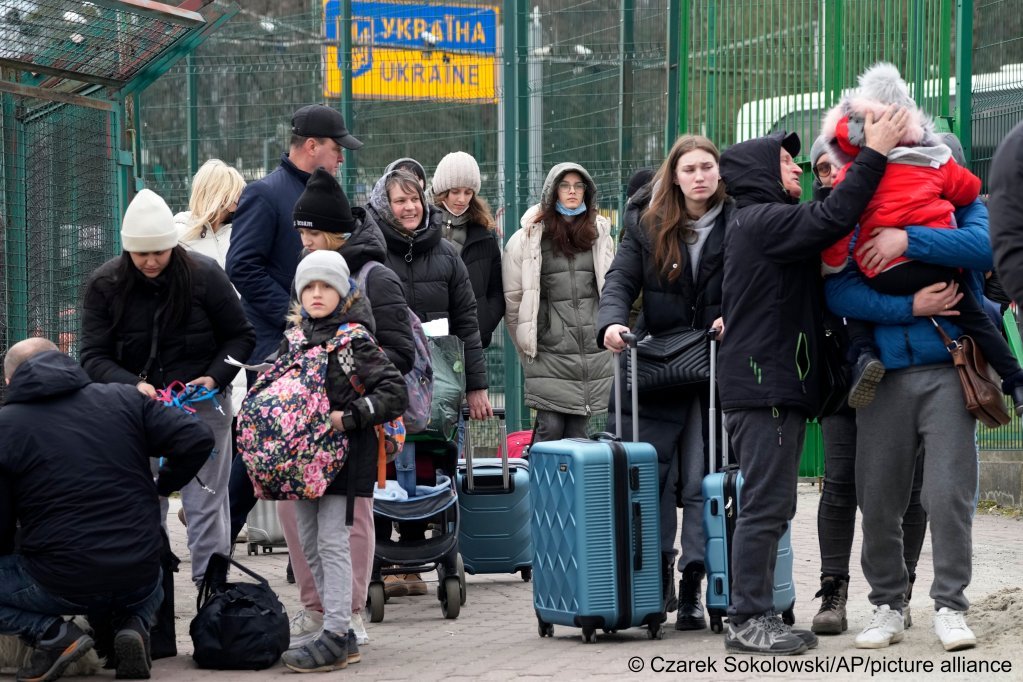A recent poll suggests that more than a quarter of immigrants in Germany are actively considering leaving the country again in the future. Among their main concerns cited were bureaucratic hurdles, a high tax burden and dissatisfaction with the overall political landscape. However, most of the immigrants in question come from either EU countries, Ukraine or Turkey.
A comprehensive online survey conducted by the Institute for Employment Research (IAB) in Nuremberg, Germany found that 26 percent of migrant respondents to a survey aged between 18 and 65 were considering emigrating again. Two-thirds of those participants were under the age of 40, representing the high rate of younger immigrants to Germany.
However, in contrast, only three percent said they were actively working on plans to leave Germany again within the next 12 months, while more than half of the participants (57 percent) said they intended on staying in the country for the long-term.
Of the three percent expressing a desire to leave, roughly half said they sought to return to their home countries while the other half indicated a wish to move to another country.
The results of the survey were broadly identical between genders; however, the authors of the documents also pointed out that the younger and older respondents were most likely to express a wish to leave Germany again, while those aged in the middle were prone to say they planned to remain in the country.

Read AlsoHelping young refugees start their careers
Germany: a mixed welcome
The 50,000 immigrant respondents expressed an overall sense of dissatisfaction with life in Germany, including high taxes, red tape, as well as the overall lifestyle. A lack of recognition of qualifications from their home countries was also among the main reasons cited for considering leaving the country again.
Political developments in the country also played a role, the poll found, with many citing they had experienced discrimination in Germany – in particular people who had arrived in Germany as refugees. At the same time, however, two-thirds of all respondents said that they felt either "fully" or "mostly" welcome in Germany.
The poll, titled International Mobility Panel of Migrants in Germany (IMPa), mainly included people whose residency status in Germany was already fully recognized, meaning that most asylum seekers whose applications were still in the process of being examined were not included.
Read AlsoIn Germany, discrimination is on the rise
Coming and going
However, in addition to these push factors, the IAB, which is affiliated with the Federal Employment Agency in Germany (Bundesagentur für Arbeit), also found that many immigrants were also considering a potential return for personal and social reasons, such as reuniting with friends, families and partners in their home countries.
Some also mentioned that they sought to pursue career goals beyond Germany to improve their economic situation elsewhere, with Switzerland and the US being cited as the most likely locations to move to for furthering professional endeavors.
Among those surveyed to date, about a quarter said they had initially come to Germany as job seekers, while another quarter said they had come as asylum seekers, with yet another quarter indicating that they had come to be reunited with their families.
Asylum seekers reluctant to leave
The survey did not make a distinction between immigrants from within the European Union and those from countries outside the bloc; however, it found that most people who wished to return to their home nations came from Poland (15 percent) and Romania (10 percent).
Furthermore, the poll specified that the highest number of overall participants in the poll were people from Ukraine and Turkey, with respondents from Ukraine leading by a strong margin. However, only six percent of Ukrainians partaking in the survey said they were planning to return home, with 8 percent of Turkish nationals also expressing the same.

The only country on the top list with a sizeable rate of people initially coming to Germany chiefly as asylum seekers was Pakistan, with four percent of Pakistani respondents saying they planned to go back home at some point.
With the exclusion of Ukraine, Turkey and Pakistan, all other top ten spots on the list of people hoping to leave Germany consisted of individuals from other EU nations.
Among the countries with the highest rates of immigrants to Germany (excluding Ukrainians, who have a special permit to come to the EU for the ongoing duration of war in their country), only 1.4 percent of Syrians said they currently were hoping to return to their country and 0.4 percent of Afghans, while in both cases about 17 percent responded that thoughts of going back had crossed their minds.
Read AlsoGermany wants to allow Syrian refugees to visit home

Skilled labor migration
Broadly speaking, the survey found that immigrants with a higher level of education or vocational training were more prone to consider leaving Germany in the future -- despite the fact that they also tend to be the ones who are more integrated and typically seem to have better German language skills.
The IAB expressed concern that this correlation could mean that the very people that Germany wants to attract to fill the growing shortage of skilled workers in the country are most likely to eventually leave Germany.
"If Germany's labor market is to continue functioning, we need skilled workers and labor from third countries," said Vanessa Ahuja, Director of Benefits and International Affairs at the Federal Employment Agency.

Lack of political solutions to retain talent
In order to disincentivize immigrants -- in particular high-level skilled workers or those wishing to become university-educated professionals -- from leaving Germany again later, some politicians have been floating new solutions.
With one of the most affected areas of skilled labor shortages in Germany being the medical field, the deputy parliamentary leader of the Christian Democrats (CDU), which is the largest party in the current government coalition, suggested recently that medical students coming to Germany from abroad to study for free should have to sign up to working in Germany for at least five years.
"Anyone who studies here should practise in the country for at least five years. Anyone who does not want to do this must pay back the costs of this first-class education," Sepp Müller told the daily newspaper Bild.
However, it is unlikely that any overarching legislation to this end could be passed at all, as higher education issues are matters that are typically devolved to the leadership of the individual federal states.
Read AlsoSyrian doctors leave Germany to work for free at home
Research to continue
The IAB says it hopes to continue this research over the coming years so it can forecast any changing trends, and thus equip key leaders and decision makers with information to help retain skilled labor from abroad.
To this end, the organization plans to widen the overall number of participants in future surveys gradually to 700,000 people in order to gain more in-depth knowledge.
For the time being, the IMPa survey says that in order to keep more foreigners, especially skilled workers, in Germany, the government should proactively set out to take a number of concrete measures:
"A comprehensive reduction in bureaucracy, centralization, simplification, digitalization and acceleration of migration and administrative processes -- from entry to employment to the recognition of qualifications -- could make integration considerably easier and strengthen the intention to stay in the long term," the report summarized.
Read AlsoGermany moves to suspend refugees' family reunification
